Investment Notes
By CUSTOS
THE fact that Mr. Callaghan has confirmed that there is to be no penal taxation of com- panies and that corporation tax would bring in the equivalent of 15 per cent profits tax and income tax at 8s. 3d. if it were 35 per cent still left the equity market as hamstrung as it was before by uncertainties. Company dividends would have to be declared gross and therefore bear tax twice. And what happens to a company making profits abroad which are subject to a foreign tax in excess of 35 per cent? Is the excess of foreign tax to be allowed to give relief for the tax paid on the dividends or are SHELL and BRITISH AMERICAN TOBACCO, which pay their dividends 'free of tax,' to face the choice of having to cut their retentions or reduce their divi- dends? No one knows the answer and the result is a steady drying-up of Stock Exchange busi- ness. The only useful clarification so far is that corporation tax will not have to be paid twice by holding companies. This relieves the invest- ment trusts and the unit trusts of a great anxiety.
Investment Trusts So the dividends received by investment trusts from companies which have already paid cor- poration tax will not be subject to corporation tax again. But this is not the only income accruing to the investment trust. There is interest from gilt-edged, debentures and preference shares, which will be subject to corporation tax, and there are dividends received from overseas companies. Hitherto there has been relief of tax in respect of the total taxation borne by the company overseas, but if Dr. Kaldor has his way the only relief in future will be in respect of the 15 per cent withholding tax. This would badly affect those investment trusts which have a high proportion of their portfolio in North American and European securities. This happens to be the group which I have lately been recommending. I must now reserve my opinion. As all invest- ment trust income is likely to be reduced to some extent under the new corporation tax system, the investor should await further clarifi- cation. There is also the question of capital gains tax, which introduces another uncertainty for investment trusts. But I have no doubt that the excellent companies I have recommended will in general maintain their dividends.
Tesco
At one time TESCO shares were yielding only 1 per cent on dividends. Today they are yielding over 3 per cent and, if the market estimates of current earnings are correct, they could be yield- ing about 9 per cent or more on estimated earn- ings. This would make the shares— on their past record—very attractive. The management of Tesco has been remarkable for its efficiency. During the seven years up to February 1964 the company's earnings grew annually at a com- pound average rate of 24 per cent. (For the last four years it was 21 per cent.) For the future it may grow less rapidly, but it has just taken over CHARLES PHILLIPS, also with a fine management record in supermarkets. With Phillips combined, the company will operate over 400 stores. Last year Tesco itself had eighty supermarkets and was planning to raise this to one hundred by .1965. At the annual general meeting the chairman stated that turnover in the first three months was up.33+ per cent and it seems likely that profits will again show a sharp increase— of the order of 25 per cent. The interim dividend has been raised from 10 per cent to
12 per cent and with a final of 15 per cent the Is. shares at 8s. 6d. would yield 3+ per cent. This more than twice-covered dividend would not be adversely affected by a corporation tax of 35 per cent.



































 Previous page
Previous page